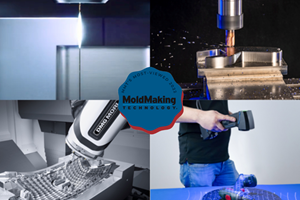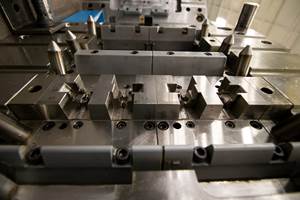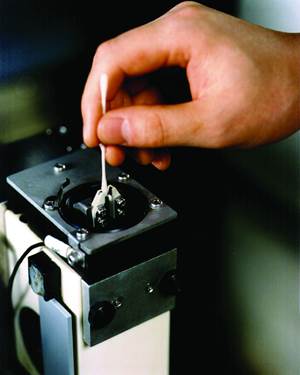Advance Tool, Inc. (ATi): Thinking Lean Gets the Green
Boasting clients like Microsoft, Procter & Gamble and Nokia, ATi's customer-driven attitude takes them around the world - and earns them MoldMaking Technology magazine's Leadtime Leader Award.
With a combined 40,000 square feet and 140 tooling professionals between its U.S. and Malaysia operations, it's no surprise that Blaine, MN-based ATi competes within the top five percent of toolmakers in North America and worldwide. And this Leadtime Leader has no problem in revealing that the secret to its success lies in the company's customer-driven focus on providing larger, more complex tools as well as programs with accelerated leadtimes.
Calling themselves a "full mold build solution provider" with design, engineering and build services, ATi's capabilities include single- and multi-cavity, multi-shot and stack molds in the consumer products, electronics, medical, industrial and semiconductor industries. During a time when the industry has experienced mostly negative growth, ATi has had annualized sales growth of 13 percent since 1999 - 15 to 20 percent last year, with 15 percent of that total coming from brand new customers. Satisfied customers include Microsoft, Dell, Tyco Healthcare, Nokia, Procter & Gamble, TRW and Asyst Technologies.
"ATi's people and customer-driven attitude are what make us unique," emphasizes President Don Larson. "We have a long history of exceeding the demands of our customers. Much of our success is driven by our engineering capabilities. With more than 15 tooling engineers on staff in the U.S., our engineering department is as large as smaller tool shops.
"Everyone within the company looks at the cost of the product we build for our customers - not in terms of the dollar on a purchase order, but as the cost to the customer if the tool doesn't perform and parts aren't being produced," Larson continues. "Many of our customers produce hundreds of millions of dollars of plastic parts from our molds. That's the value that ATi cares about." Those hundreds of millions of dollars of plastic parts often make their way back to the company in photograph form. "We are on the leading edge of all of these amazing new products," Larson says. "The Microsoft Xbox, new cell phone technology - it stirs a lot of interest and excitement in the plant. We bring in ads from newspapers that feature our stuff and put it up on the bulletin board. It's really a big deal."
Humble Beginnings
It was 1977 when current CEO David Dunn and Rudy Kessler (now retired) started the company - then called Advance Tool - in a single-car garage with a mere $5,000. "Rudy and I were sitting around at break one day at our former company," Dunn recalls. "He was the foreman and I was the lead man. We just started saying that if these guys [the owners] could make money at this, we know we can too. So that's how we got started, and we just kept beating on doors and hustling a little harder than anybody else."
The duo - with the help of a part-time toolmaker - was doing little jobs here and there when Dunn just happened to be at the right place at the right time. "I was having dinner out with my wife and family, and at the table behind us was a former coworker who had gone to work at Tonka Toys as an engineer," Dunn says. "When he asked me how big my shop was, I let him know that we could handle whatever he had. I sort of embellished. The next day, he called and offered us a six-mold prototype package that his internal shop couldn't handle. Back in the 70s, that was huge job. So we did it, working seven days a week for close to 20 hours a day."
That job put Advance Tool on the map. In 1981, the company moved into a 4,000-square-foot building. By 1982, the size of the facility was doubled and the company became a member of the American Mold Builders Association (AMBA). In 1991, it acquired CAD/CAM Contours - a mold design house - which doubled its engineering capabilities.
Growth Spurt
After a decade of continued success, the company took another step toward the future in 1992 when it established an office in Taipei, Taiwan, to develop its offshore tooling relationships. According to Dunn, the company's growth in the 90s was primarily driven by the consumer electronics and mobile phone markets. "We had begun to expand and invest in growing sales in the area of consumer products and medical markets," he states. "We continue to stay on the leading edge of industry trends and technology by always looking to work with the best and most innovative customers in their respective industries. That, combined with the attitude of 'get better or die,' keeps us always looking for new technology and processes to get better in quality, speed and efficiency."
Advance Tool also saw significant improvements in process and efficiency when it became an ISO 9001 facility in 1997. Two years later, ATi Precision in Malaysia was opened so relationships could begin with Chinese counterparts. That same year, a mold development center - Advanced Molding Technologies - was established. Then, in 2001 a product design division - ATi Product Design - was added to the company's repertoire. Its focus was to assist customers earlier in their product development cycle with part design that improves prototype success rate and accelerates the production tooling design process.
The year 2001 also was important in terms of the company's most lucrative job - the multi-million-dollar Microsoft Xbox tooling program. "We were awarded this project after successfully supporting earlier phases of the project," notes Managing Director, Business Development Steve Johanns. "The Microsoft relationship and the whole culmination into the Xbox is an interesting story for us. The relationship started about nine years ago when they kind of threw us a ball and we did a revision for them. We first built them a $50,000 tool for a simple piece that turned into a mouse. Once we excelled on that job, they kept giving us more and more opportunities to showcase our abilities. During the years, we kept on getting more involved with them - doing more mice, keyboards, gaming controls - all of which led into the introduction of the Xbox program. At the time, we didn't know how big of a deal it would become, but it ended up being this enormous program for us as a company.
"So, we went from a single cavity mold nine years ago to a 64-mold package that we completed for them," Johanns continues. "Most of our relationships start out in a similar fashion to our work with Microsoft. We rarely lose a customer because once we get the opportunity, we give them the best in quality, craftsmanship, performance and service."
Leading in Leadtimes
So, how does ATi manage to keep growing in today's somewhat shaky economic climate? According to Johanns, the company maintains the "most competitive leadtimes in the industry" by focusing on the following: capital reinvestment in new technology (average 10 percent per year), early involvement in customers' product development cycle, concurrent engineering with free-flowing communication and a superior project management process.
Capital Reinvestment
According to Johanns, ATi has been one of the "innovation leaders" in true high-speed hard-milling, utilizing equipment like the Makino SNC64S, GF6 and the OKK VM7. "Through high-speed hard-milling we have reduced the number of operations and associated time and cost," he notes. "Our investment strategy in capital equipment and information technology revolves around getting faster while improving quality and performance." ATi also has begun partnering at the university level for next-generation technologies like laser-based direct metal fabrication and rapid prototyping tools. "The barriers of entry are getting higher and ATi looks at smart capital reinvestment as the bricks to the wall."
Early Involvement
The Cylon Mouse from Microsoft is a great example of the effect ATi can have with early involvement and concurrent engineering, Johanns points out. "At the time it was the most complicated mouse Microsoft had undertaken," he explains, "and we were able to design, build and sample single-cavity P20 prototypes in five weeks as well as complex, multicavity, hardened steel production tools in eight weeks. It is recognized as one of the most successful tooling programs for Microsoft. Because our engineers were plugged into the program at the design stage, we were able to give input and make recommendations on the part design that improved manufacturability and quality of the build. It also allowed us to pre-plan the tool build process so we could accelerate it through the shop once it came out of design."
Concurrent Engineering
"ATi utilizes a truly concurrent engineering process in which our tooling engineers work concurrently with the mechanical and tooling engineers of our customers on one side and our tool shop on the other," Larson states. "A good example of concurrent engineering is a program that ATi built for a major equipment supplier to the semiconductor industry. The customer placed eight molds with ATi, all due in 11 weeks. These were tools that fit in presses ranging from 125 tons to 1,200 tons. As you might guess, they were early. During this process, the customer had engineers designing parts while ATi cut steel, an amazing task that was successful."
Project Management
ATi manages projects with a team approach that includes a representative from sales, engineering and manufacturing for every job. "This team is involved in all preliminary design reviews and kick-offs with the customer," Johanns states. "The team also meets weekly as part of a production meeting. This communication across all departments is one of the key drivers to our ability to move projects through. We also are focusing on implementing a lean manufacturing initiative in partnership with our customers and suppliers."
2003 and Beyond
ATi no doubt is intent on making its dreams become a reality. It expects to double the size of the company by 2006 and achieve $40 million in sales. "To achieve that goal, we will strategically invest to broaden our portfolio of solutions while focusing on customers that fit more closely with our value proposition," Johanns notes. "We also have begun to aggressively invest in developing our sales force and marketing efforts to take advantage of the growing list of customers who have been forced to look for new suppliers because their existing suppliers have been unable to successfully manage their business and/or have gone out of business." Remote sales offices have recently been opened up in the Midwest and Northwest.
Adds Johanns, "The net effect of ATi's model as a value-added moldmaker is to offer the highest level of quality and support, while impacting and reducing total time to market and associated costs. "This - combined with our ability to grow while the rest of the industry has seen slow to negative growth - puts ATi in an increasingly good position that's more difficult to duplicate." Difficult to duplicate indeed! ATi has come a long way from that single-car garage. Twenty-five years later it has 140 employees, customers in 20 countries and business dealings with some of the leading companies in the world - proof positive that working harder and smarter can yield decades of success.
Related Content
MoldMaking Technology's Most-Viewed Content 2022: Products
MMT shares the five top-viewed technologies, equipment and services of 2022 in each Engineer, Build, Maintain and Manage tenet based on Google Analytics.
Read MoreHow to Improve Your Current Efficiency Rate
An alternative approach to taking on more EDM-intensive work when technology and personnel investment is not an option.
Read MoreExtensive Evaluations Build The Plastek Group’s EDM Arsenal
Sinker and wire EDMs selected for speed, volumetric accuracy, surface finish, reliability, cost of ownership and extensive warranty.
Read MoreMaintaining a Wire EDM Machine
To achieve the ultimate capability and level of productivity from your wire EDM on a consistent, repeatable and reliable basis, regular maintenance is a required task.
Read MoreRead Next
Reasons to Use Fiber Lasers for Mold Cleaning
Fiber lasers offer a simplicity, speed, control and portability, minimizing mold cleaning risks.
Read MoreHow to Use Continuing Education to Remain Competitive in Moldmaking
Continued training helps moldmakers make tooling decisions and properly use the latest cutting tool to efficiently machine high-quality molds.
Read More


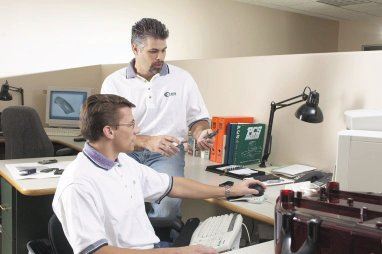
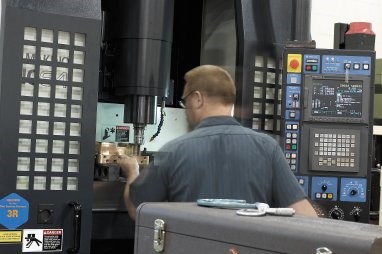
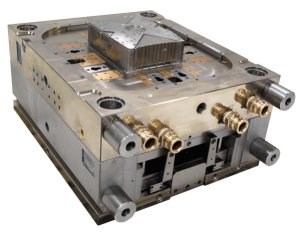



.jpg;maxWidth=300;quality=90)




_300x250 4.png;maxWidth=300;quality=90)









